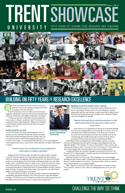
 |
 Building on Fifty Years of Research Excellence
When Trent was founded in 1964, the seeds for excellence in innovative research and teaching were planted in the spirit of creating a world-class university. As the University has evolved over fifty years, Trent has been engaged in cutting-edge research in pivotal areas like humanities and culture, the environment, and healthy and sustainable communities. “Trent has always been a really fertile and open-minded place, where people are willing to experiment,” said Dr. Neil Emery, vice president of Research and International. “Without strict boundaries around disciplines, faculty members feel like they can do almost anything to succeed.” Fertile ground for research As Trent celebrates its 50th anniversary throughout the 2014-15 academic year, the University’s faculty, staff, students and alumni reflect on five decades of uniquely interactive learning. Often, it is the connection between research and teaching that takes place at Trent that makes it shine – an outstanding faculty publication record, and attracting top research grants in the sciences, social sciences and the humanities, all speak to fifty years of excellence. Engagement from the Peterborough community and academic leaders committed to research created an ideal place for both young and established faculty members to initiate new programs. The ingenuity of those researchers who were attracted to Trent has resulted in an interdisciplinary hub of knowledge, establishing facilities such as the Water Quality Centre, an international centre for aquatic science, and the Trent Centre for Aging and Society, which has received widespread acclaim for its integration of faculty from Sociology, Psychology, the Trent/Fleming School of Nursing, English Literature, Gender & “Research connections made by our faculty around the world lead to opportunities for undergraduate and graduate students to work in labs and research centres and undertake exchanges,” Professor Emery said. “Students also benefit when faculty bring experiences of their global travels back into the classroom to address topical, urgent issues.” Applying research to critical issues in society The interdisciplinary aspect of Trent’s research and teaching model is a key factor in attracting star faculty members who will challenge the way their students think and learn, and contribute to global knowledge. Faculty members build broad and strong networks with colleagues across a multitude of fields, each person bringing a new strength. “In the sciences, we’re analytically very strong, but we speak the language of social sciences and humanities as well, which allows us to have a two-way relationship between different disciplines,” Prof. Emery said. “Faculty in the social sciences and humanities may learn what is possible from science and technology, and scientific faculty gain awareness of current issues in government relations, policy development, and international affairs.” Partnerships like these are helping Trent to develop further expertise on socially relevant cross-disciplinary topics like global warming, poverty, Indigenous issues and aging demographics. “The adaptation of society to major political, social, economic and environmental change is a theme of research at Trent,” Prof. Emery said. “These efforts will allow Trent to engage in the community and at a new level in Canadian research.” Looking to the future, the University’s Strategic Research Plan for 2014-2018 will leverage Trent’s existing strengths to expand its capacity for interdisciplinary research in order to reach new levels of excellence. Speaking of the plan, Prof. Emery said, “We are building on our current strengths, including our active research centres, Canada Research Chairs, and many successful awards from the Canada Foundation for Innovation – those speak loudly to where our expertise exists currently and also to our emerging strengths.” With a distinctive research plan in place and a strong history of research excellence, Trent is poised to continue to make a name for itself throughout the next 50 years and beyond. |

































